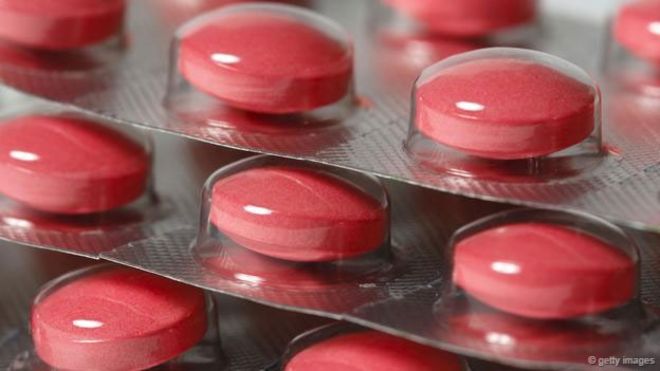你想知道的关于女用伟哥的一切 - BBC琳达·格迪斯(Linda Geddes)(2023年6月14日)

芭芭拉·加图索(Barbara Gattuso)第一次注意到自己对丈夫格雷格(Gregg)失去了“性趣”是在她即将奔四的时候。她说:“我从来没有和他谈论过这事,但是性这件事,怎么说呢,我不那么关心了。”
加图索今年已经66岁了,这些年来,她变得越来越擅长从她丈夫面前溜走来避免直接对他说“不”:她总是比他更早上床睡觉,早上也更早起床。“不久,我不得不问自己‘到底发生了什么?’我爱我的丈夫,我们的婚姻很美满,拥有可爱的孩子。那么,到底发生了什么?”
问题在于性欲。正如大多数保持长期伴侣关系的人所证实的那样,最初的激情会随着时间消逝。加图索对性爱不再有任何性趣:不仅仅是对她的丈夫,对任何人她都无法再点燃爱欲的火光。一些性心理学家宣称这种性欲上的波动完全正常,尤其当女人年岁渐长时。另一些人相信性欲的减退是一种身体状况,它反映了大脑中化学物质的失衡。
现在,有一种药物可以应对如斯情况。在今年6月3日和4日,美国食品和药品管理局(FDA)将召集一个顾问小组来决定被称为“女用伟哥”的氟班色林(Flibanserin)是该被批准投入市场还是被尘封于垃圾箱中。对此,民众的意见分歧巨大,而支持和反对的双方都有强有力的论据。
错误的回路
究竟是什么导致了女人“性趣”不再,而氟班色林又能做些什么呢?年岁渐长时,显然不是只有女人才为性事所扰。然而,问题的本质在两性中却表现得截然不同。

对于女人来说,性功能障碍有三个成因:欲望,欲望,还是欲望。
加州大学圣地亚哥分校的精神病学家史蒂芬·斯特尔(Stephen Stahl)说:“在医学界有个说法,男性性功能障碍有三种形式,勃起,勃起,还是勃起。而对于女人来说,性功能障碍有三个成因:欲望,欲望,还是欲望。”
尽管性被认为和大脑的奖赏回路有关,对于科学家来说,性欲减退的真正原因(以及性欲产生的根本缘由)至今仍是个谜。
一种理论认为所谓的性欲减退(HSDD),即女性性兴趣/性唤起障碍,是由负责控制日常任务的那部分大脑额叶无法正常“切断”所导致的。这部分大脑额叶会负责诸如记得寄出一张生日卡片,或在工作中解决一个问题等任务。因而当这部分大脑额叶无法切断时,涉及积极性和快感的奖赏回路也受到了抑制。
伟哥在解决男性性功能障碍上的卓越表现(更不消说它为开发公司所赚得的巨大利润)拉开了比赛序幕:现在,我们必须为女性性功能障碍也找到一种灵丹妙药,而这一次相比生殖器,科学家更关心的是大脑。
氟班色林正是比赛的领跑选手之一。最初,它被作为抗抑郁药进行开发,但很快就被发现它对情绪的治疗效果并不出色。然而,参加临床试验的女人们却报告了一个令开发者意想不到的副作用:她们对性产生了更大的兴趣。
氟班色林的工作机理是调整大脑奖赏通路中的信号分子——多巴胺、去甲肾上腺素、血清素——并让它们重获平衡。“我们认为它不是正常化了通路,就是补偿了缺失的信号分子,总之它改变了通路,”斯塔尔说,“这很可能是因为它允许女性脱离这些抑制性冲动和性兴趣的大脑前额回路。”
重燃爱欲
氟班色林因为有限的效果被剥夺了抗抑郁药的头衔,但很快它就重新赋予了新的使命:女性欲望的助推器。
然而,最初的后续药品试验发现,那些报告自己获得了“更满意的性生活”的女性并没有在性欲上呈现显著性增长。因此,2010年,美国食品和药品管理局拒绝批准此药物。
不过进一步研究表明氟班色林确实可以增强性欲,虽然效果并不显著。“问题是,你要怎么衡量性欲的增强呢?”平分运动(the Even The Score campaign)的主席苏珊·斯凯伦(Susan Scanlan)问道。

平分运动支持通过药物解决女性性欲减退问题,然而值得注意的是,斯凯伦是被一家制药公司以一小笔费用雇佣而担任运动主席的。她指出,女性的性欲基线普遍很低。“美国女性平均每月有三次性行为,如果(病人)并没有达到三次,是不是就说明药物失败了呢?”
事实上,氟班色林的试用报告表明,在28天的周期内,服药的患病女性平均有2.5次性行为,而没有服用药物的患病女性只有1.5次。
当然,部分受试者相信她们得到了巨大的改善。2011年,加图索报名参加了氟班色林的试验。起初,她吃下的是安慰剂,这之后无论她尽多少努力想要重启性生活,都于事无补。
然而当试验结束后,她得到了服用真正药物的机会。“仅仅几个星期,我焕然一新,”她说,“我会在半夜醒来,爱抚我的丈夫。亲密、欲望、羁绊,它们就在那里,百分百存在。”
然而伴随着病情改善的还有包括嗜睡、头晕和恶心等在内的一系列副作用。斯坎伦却指出,和伟哥与其他治疗勃起障碍的药物相比,氟班色林的副作用并不那么严重。他解释说:“我们不妨考察一下26种被批准发售用来治疗男性勃起障碍的药物,它们的副作用包括心脏病、失明、猝死,还有我自己觉得最有意思的,阴茎破裂。”
还有人担心批准氟班色林会鼓励女性投向药物的怀抱,而她们本该以伴侣关系咨询、或分析其他问题(诸如过度工作和抑郁)作为治疗手段的。
另一些人则担心氟班色林不被批准会阻碍医学家对其他有效解决方法的积极探索。
最后的救命稻草
毫无疑问,没有人认为在排除诸如疲倦、其他药物作用、压力、伴侣关系问题等因素前,女性性唤起障碍能够迅速得到改善。斯特尔说:“如果你对性缺乏兴趣,你需要问自己:你是只对自己的丈夫失去兴趣,却对隔壁邻居怀有幻想,还是你对所有男人都失去了兴趣?一粒药丸对一段糟糕的婚姻于事无补。”
加图索同意是该有地方为那些关系不佳的伴侣提供咨询服务,但她坚信那对像她这样拥有美满婚姻的夫妻没有帮助。“如果你得的是糖尿病那样的病,你就算和咨询师谈到太阳下山也不会对病情有任何帮助,女性性欲衰退是大脑机制的失衡。”
像她那样的患者视氟班色林为她们最后的希望:“当我知道药物上市被暂缓后,我感到无比沮丧,这不是为我一个人,而是为千千万万像我一样无力改善当前状况的女人们。她们需要氟班色林。”
(责编:友义)
Everything you need to know about 'female Viagra' - By Linda Geddes
Barbara Gattuso was in her late 30s when she first noticed a change in her attitude towards sex with her husband, Gregg. “I never spoke to him about it, but sex was just – I could care less,” she says. Over the years, Gattuso, now 66, became adept at hiding from her husband in order to avoid rejecting him outright; she’d often go to bed early, and get up before he did. "After a while, it was like ‘what is happening here? I love my husband, we have an incredible marriage, beautiful children; what is going on?’"
The problem was desire. While most people who’ve been in a long-term relationship can attest to a dampening of the initial fireworks over time, Gattuso had no interest in sex whatsoever. And it wasn’t just her husband; she couldn’t raise a flame for anybody. Some sexual psychologists claim that such fluctuations in sexual desire are perfectly normal – particularly as women get older. Others believe this kind of desire deficit is a medical condition; the result of an imbalance of chemicals in the brain.
Now there may be a drug to treat it. On 3 and 4 June, the US Food and Drugs Administration (FDA) will convene an advisory panel to recommend whether Flibanserin – touted as the “female Viagra” – should be approved for use in patients, or confined to the dustbin. The question is divisive, however – with strong arguments for and against.
Faulty circuitry
So what causes this absence of sexual desire, and how might Flibanserin help? Women clearly aren’t alone in hitting against sexual problems as they age; the popularity of Viagra is a testament to that. To quote the comedian, George Burns: “Sex at age 90 is like shooting pool with a rope.” However, the nature of the problem often differs between the sexes.
“There is a saying in medicine that there are three forms of sexual dysfunction in men: erections, erections, and erections,” says Stephen Stahl, a psychiatrist at the University of California in San Diego. “And there are three causes of sexual dysfunctions in women: desire, desire, and desire."
The exact cause of this decline – and even the origins of desire in the first place – is something of a mystery to scientists, although they know that the brain’s reward circuitry is involved. One theory is that so-called hypoactive sexual desire disorder (HSDD) – also known as female sexual interest/arousal disorder – results from an inability to switch off the frontal parts of the brain that handle everyday tasks, like remembering to post a birthday card or resolving a problem at work. As a result, this reward circuitry, which deals in motivation and pleasure, is inhibited.
Once Viagra had proven so successful at treating male sexual dysfunction (not to mention lucrative for the company that developed it), a race kicked off to find a similar drug for women – but one that treats the brain rather than the genitals.
Flibanserin is one of the forerunners. Initially developed as an antidepressant, it was found to have little effect on people’s mood. However, women enrolled on clinical trials of the drug started to report an unexpected side-effect: feeling more interested in sex.
Flibanserin seems to work by tweaking the balance of signalling molecules (neurotransmitters) in these circuits – namely dopamine, noradrenaline, and serotonin. “We think it either normalises or compensates for whatever isn’t normal to make these circuits tuned,” says Stahl. “It may very well be that it allows women to disengage these frontal circuits that are inhibiting sex drive and interest.”
Rekindled lust
Although the drug was dropped as an antidepressant, because of its limited effect, it was soon being repurposed as a desire booster for women with HSDD. But although initial follow-up trials found that women reported an increased number of “satisfying sexual events”, they failed to demonstrate a significant effect on sexual desire. As a result, the FDA rejected the drug in 2010.
Further studies have, however suggested it does boost sexual desire after all – although the effect is modest. “The problem is: how do you measure an improvement?” asks Susan Scanlan, chair of the Even The Score campaign, which champions a drug solution to HSDD. (It’s worth bearing in mind, however, that Scanlan is paid a small fee, by a pharmaceutical company, to chair her campaign.) She points out that the baseline in general is low. “The average American woman has sex three times a month; if [the patient] didn’t have sex three times, does that mean the drug failed?” In fact, women on Flibanserin reported 2.5 sexual events in a 28-day period, compared to 1.5 in women with HSDD who were not taking the drug.
Certainly, some of the patients in these trials believe they have seen big improvements. Gattuso enrolled on a trial of Flibanserin in 2011. Initially she was given the placebo, which she says did nothing – despite her best efforts to rekindle her sex life. But after the trial had finished, she was offered a chance to take the real thing. “Within a couple of weeks I was a totally different person,” she says. “I would wake up in the middle of the night, and caress my husband. The closeness, the desire, that bonding, was totally 100% there.”
One concern, however, has been side effects that come with those improvements – including drowsiness, dizziness and nausea. Scanlan, however, points out that they are generally less extreme than those that come with Viagra and other treatments for erectile dysfunction. “Let’s look at some of the side effects for the 26 drugs that have been approved for men with sexual dysfunction,” says Scanlan. “We have heart attack, blindness, sudden death, and my personal favourite: penile rupture.”
Others fear that approving Flibanserin would encourage women to seek a medical solution for a problem that might be better resolved with relationship counselling, or by addressing other issues in their lives such as overwork or depression. “When it comes to desire, relationships are important, context is important, situational factors such as mood and privacy are important,” says Cynthia Graham, senior lecturer in health psychology at the University of Southampton in the UK.
Even so, she agrees that a pharmaceutical solution could be helpful in certain situations.“I do think that some women have problems with desire, and down the line I think it could be really helpful to have a drug treatment for women. But it needs to be a drug that’s clearly clinically significant, and we need to know more about the side effects,” says Graham. Some fear, however, that rejecting Flibanserin will stymie attempts to find other, more effective alternatives.
Last hope
Certainly, no one is suggesting that it should be a quick fix before many other factors, including tiredness, other medication, stress, and relationship issues, have been ruled out first. “If you have a lack of interest in sex, you need to ask: is it just your husband, and you’re fine with the next-door neighbour, or is it a general lack of interest? A pill isn’t going to help a bad marriage,” Stahl says.
Gattuso agrees that there may be a place for counselling when there are genuine relationship issues, but she is adamant that it would be of little help to her marriage. “When you have a medical condition like diabetes, you can talk until the cows come home and it is not going to change that disorder,” she says. “HSDD is an imbalance in the brain.”
Patients like her see Flibanserin as their last hope: “When I was told the drug was being pulled I wasn’t just upset for me, but for hundreds of thousands of women out that have nothing to help them with this condition,” she says. “They need this drug.”